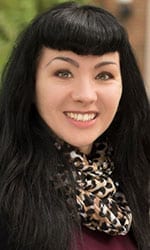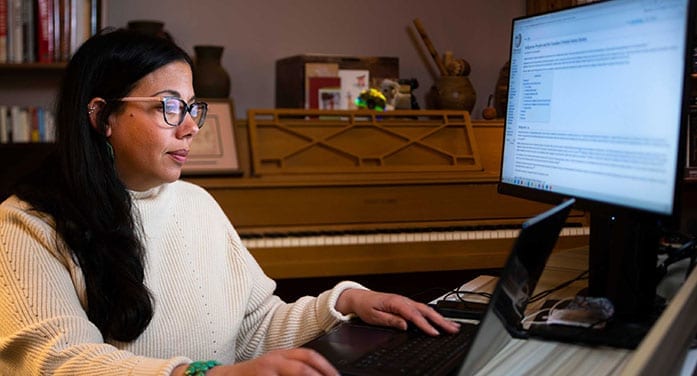Last fall, students in a Native Studies course worked to improve representations of Indigenous peoples on one of the most popular websites in the world.

Professor Nykkie Lugosi-Schimpf
The course, Colonialism and the Criminal Justice System, saw students create Wikipedia articles on issues that dealt with Indigenous peoples and Canada’s criminal legal system, filling some of the site’s gaps in coverage.
For Faculty of Native Studies grad student Kris Cromwell, it was an exciting opportunity to impact the way racialized groups are depicted on Wikipedia.
“There’s this established bias in the media, and it affects me, it affects people who look like me, and it affects the people that I’m writing about. And a diversity of viewpoints is really the only way we can combat inherent bias and negative stereotypes.
“And while not everyone can be a journalist,” Cromwell added, “everyone can be a Wikipedia editor.”
Course professor Dr. Nykkie Lugosi-Schimpf said she first got the idea to bring Wikipedia editing into the classroom after reading an article in which Erin O’Neil, the U of A’s Wikipedian in Residence, talked about using Wikipedia for social justice projects. From there, Lugosi-Schimpf got in contact with Wiki Education to set up the course.
“The dominant narrative about Indigenous peoples’ experiences with aspects of the criminal justice system is always damage-centred or victim-blaming. This [project] would equip and empower students with the tools to actually do something to change that discourse.”
According to a Wikipedia survey in 2018, the average Wikipedia editor is a white male from North America with a post-secondary education. Encouraging voices of racialized people, women and other less-represented demographics can help to counterbalance that dominant perspective, said Cromwell.
For the course, Cromwell wrote the article, “Indigenous Peoples and the Canadian Criminal Justice System.”
“I’m a Black woman in the Faculty of Native Studies, and I thought it was important to have something from the perspective of a racialized person with education and training in critical Indigenous studies,” said Cromwell.
In previous iterations of the course, students worked directly with organizations and communities to fulfil the community service-learning (CSL) component. Due to the COVID-19 pandemic, in-person CSL activities weren’t possible, so the Wikipedia project was a great alternative, said Lugosi-Schimpf. And it offered important opportunities for students.

Graduate student Kris Cromwell wrote a Wikipedia article about Indigenous Peoples and Canada’s criminal justice system to help fill in information gaps on the popular site. (Photo: John Ulan)
“Indigenous peoples have been spoken for and talked about, and I think that for students to be able to speak for themselves, about themselves, rather than have someone else tell their stories is really important,” Lugosi-Schimpf said.
The project was structured so that students peer-reviewed each other’s assignments before posting to Wikipedia. That enhanced their editing skills for scholarly work and Wikipedia articles and fostered a sense of community in a challenging time.
Working on their projects and having to do peer review allowed students to connect to a class community for support with the topics they covered and the challenges of the pandemic, she said.
“It’s difficult to get that student connection during a pandemic,” said Lugosi-Schimpf.
“But especially given the heavy, at times traumatic, subject matter that we deal with in the class, it’s so important to get that connection beyond just discussions over Zoom.”
Cromwell, who has continued editing Wikipedia articles since the class ended, said while the changes are small, they can have a big impact.
“If you are continually reading the same tropes about Indigenous people – if you see them referenced as ‘Indigenous Canadians’ and not as aligned with their own politics, if you’re seeing the word not capitalized – these small things repeated over and over again are significant in setting perceptions,” she said.
Increasing the diversity of voices and having a few people making small and steady changes can lead to a big movement, Cromwell and Lugosi-Schimpf said.
“Sometimes meaningful social change isn’t this huge sweeping moment or policy, but rather it’s just starting to shift the dialogue and think differently about how we’re choosing to tell stories,” said Lugosi-Schimpf.
“This gave the power back to students.”
| By Jordan Mae Cook for Troy Media
This article was submitted by the University of Alberta’s Folio online magazine. The University of Alberta is a Troy Media Editorial Content Provider Partner.
© Troy Media
Troy Media is an editorial content provider to media outlets and its own hosted community news outlets across Canada.


